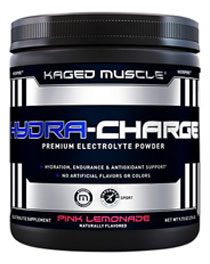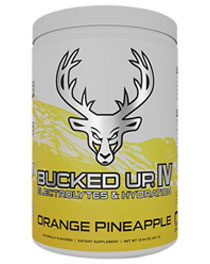
By clicking on the product links in this article, we may receive a commission fee at no cost to you, the reader. Sponsorships and affiliate commissions help support our research so we can help you find the best products. Read our full affiliate disclosure here.
You’ve heard it before—runners must be hydrated. But what exactly does that mean? Hydration comes down to having the right amount of fluids and electrolytes.(1) It shouldn’t be too complex, but it’s, unfortunately, a balance that many runners get wrong. There are a few hydration facts athletes should pay attention to, but too often, water consumption and electrolyte balance fall by the wayside when they should be a pillar of training.
Interestingly, runners, more than other athletes, have an aversion to drinking while running. When in the midst of a race, it might be a fear of wasting time at an aid station. Or runners don’t know how best to carry water during a race. I personally had an issue drinking while running. It took me three marathons, six half marathons, and about one thousand shorter races to figure out that proper hydration is crucial to getting to the finish line strong. It also took me these races and all the training miles to find the products and timing that work for me. It will vary from person to person, but there are some general guidelines that can help you avoid dehydration and system shutdown while you’re running.
While I know what’s helped me, I am not a dietician, so I called Natalie Rizzo, MS, RD, author of Planted Performance: Easy Plant-Based Recipes, Meal Plans, and Nutrition for All Athletes, who offered amazing insight into proper fueling and hydration. In this guide to fluid and electrolytes for runners, we'll dive into what to drink before, during, and after workouts and look at some of the best electrolyte drinks for staying hydrated.
The Basics of Fluid and Electrolytes for Runners
Registered dietitian Natalie Rizzo is passionate about hydration for runners and knows you’ll be too, once you see how hydrating can positively affect your performance.
“60 percent of the body is made up of water,” she says. “And we lose water every day through urination, perspiration, and respiration. So you have to take that water back in to have your body function normally.”
Everyone—runners and couch enthusiasts alike—should be aiming for proper hydration. But we understand it can be challenging. If you know this is an area you can improve on, there are several water-drinking apps available to make this process easier.
The National Academy of Medicine uses the guideline that healthy men need about 13 cups of fluids, and healthy women need about nine cups of fluids per day.(2,3) However, runners may need more fluids to hydrate effectively.(4) Your hydration needs depend on specific variables such as body size, activity level, and sweat frequency. According to a 2020 review published in the Journal of the International Society of Sports Nutrition, there are multiple methods to test your hydration status since water is found in many different areas of your body, including your blood, plasma, and urine.(5) While blood tests are certainly meaningful, and plasma tests are often the gold standard, experts say if you want to know your true hydration status, you shouldn’t rely on a combination of tests rather than just one.(6) That said, hydration tests can be costly, invasive, and time-consuming for most runners. A more quick and convenient method of determining your hydration status is to check your urine color after using the bathroom to give you an idea of your hydration.
"The simplest way to know if you’re hydrated is to look at the color of your urine,” explains Rizzo. “If you're going [to the bathroom] frequently and it's a lighter color, like the color of straw, that means you’re taking in enough fluids. If you don’t have to go to the bathroom, and it’s been five or six hours, and it’s a dark color and not a lot of it when you do have to go, [then] you’re not properly hydrated."
This daily monitoring of your urine color and output is important for runners because, as Rizzo explains, you can’t merely hydrate the day or week before the race. Practicing hydration techniques throughout your training cycle will set you up for success.
Finally, don’t just stop drinking when your run is finished. You will need to rehydrate with water or, if you sweat quite a bit, with a sports drink with electrolytes.

What Are Electrolytes?
The second piece of the hydration equation is electrolytes. If you’ve ever finished a run and felt salty—with visible streaks of saltwater pouring from your skin—that’s your body sweating out essential salts and minerals, otherwise known as electrolytes.
“Electrolytes are [essential minerals] sodium, potassium, calcium, and magnesium,” Rizzo says, citing the big four. “And they are the minerals that you lose in sweat.”
As runners, we sweat a lot. And the farther we go, the more we sweat, which is why electrolyte drinks and gels are made to replenish those we lose through sweat in order to help maintain hydration levels.
Speaking of which, here are a few product recommendations you can easily find at The Vitamin Shoppe for electrolyte replenishment when you're on the run.
- Liquid I.V. Hydration Multiplier
- Nuun Sport Hydration
- Skratch Labs Hydration Sport Drink Mix
- Force Factor Liquid Labs Hydration
- Bucked Up Hydration
- Kaged Hydra-Charge
Types of Electrolytes
Electrolytes help your body absorb fluids. As Rizzo mentioned, the four main electrolytes are sodium, potassium, magnesium, and calcium.
Here’s information from the National Library of Medicine about the six main types of electrolytes and why they benefit your hydration health.(7)
- Sodium (Na+): The most plentiful electrolyte in the body, sodium plays a crucial role in maintaining fluid balance, nerve function, and muscle contractions.(8)
- Potassium (K+): Potassium is another hero in supporting fluid balance. It’s also essential for maintaining proper heart function.(9) And if you’ve ever told a friend complaining of cramping to eat a banana, it’s because potassium plays a role in good muscle function too.(10)
- Calcium (Ca2+): Calcium also prevents cramps by helping our muscles, and supports nerve function.(11)
- Magnesium (Mg2+): Magnesium is a major player, and it’s involved in over 300 enzymatic reactions in the body. It supports energy production, muscle function, and bone health.(12)
The next two electrolytes play more of a supporting role, but are still crucial for runners:
- Chloride (Cl-): Chloride works with sodium to maintain fluid balance.(1)
- Phosphate (HPO42-): Phosphate is used for energy metabolism and bone health.(13)
Why Fluid and Electrolyte Balance Is Important for Runners
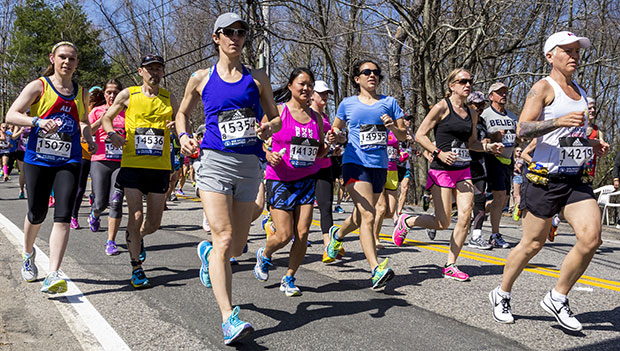
Balance is the keyword when it comes to hydration, and water consumption alone isn’t enough to create it. As you can see, the many types of electrolytes play significant and varied roles in helping you run.
So if you're attempting to rehydrate by drinking loads of water and you throw the balance off, at the very least, you’ll feel lousy. You might even experience cramps and side stitches, which are painful and can hinder your performance.
Electrolyte imbalance can cause other unpleasant symptoms that could lead to a DNF (Did Not Finish). These include dizziness, nausea, fatigue, loss of consciousness, constipation, dark urine, muscle weakness, and painful joints.(14)
At the very worst, you can cause hyponatremia, which means there isn't enough sodium in your blood.(15)
"I'm sure you've probably heard that some runners go overboard with water, and they get really sick,” says Rizzo. “Essentially, hyponatremia means that you're flushing out your body with water, and [not balancing it with] sodium. It can get really dangerous."
How Hydration Drinks Support Running Hydration
Can you believe that in the 1970s, athletes would run marathons without sports drinks or water? It wasn’t until recently that exercise scientists realized that proper fueling could increase a runner’s performance by up to 20 percent.(16) More recent studies have shown just how impactful carbohydrate-electrolyte sports beverages can be for athletes.(17)
So how do hydration drinks work? Electrolyte drinks and gels contain a balanced combination of water, sodium, potassium, and other minerals to replenish what you lose through sweat. Many of these drinks include carbohydrates, such as glucose or sucrose, which provide an additional energy source for sustained performance.
In the simplest terms: “The sports drinks help you bring in more carbs that give you the energy and then also bring in the fluid that keeps you hydrated,” adds Rizzo.
Caffeine for Running
Nowadays, there are sports drink options with caffeine, which Rizzo says you should test if you’re curious about how they'll affect you.
“It will be okay [to drink caffeinated sports drinks] as long as you practice with [them],” she says. “Caffeine [can be] beneficial for athletes. There’s tons of research on it. It [may help] boost performance.”(18)
Nootropics for Running
Nootropics, or smart drugs, are supplements that may help improve cognitive ability, focus, memory, calmness, and overall mental performance.(19) There have been small studies on athletes that show improved mental ability when using nootropic drinks.(20) Still, more research needs to be performed to substantiate these promises, but anecdotal reports from runners say that using nootropics when running has helped keep them centered.
If you are considering incorporating nootropics into your training, first talk to your physician to make sure they're right for you. And make sure you are still getting adequate water and electrolytes. There are plenty of products on the market that will provide great hydration with the addition of nootropics.
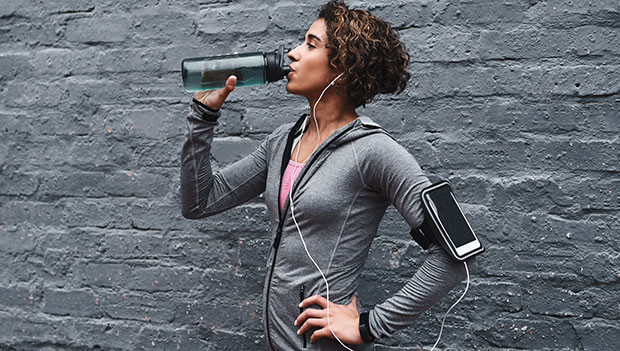
How to Have Enough Fluid and Electrolytes While Running
It’s difficult to know how much fluid and electrolyte intake is enough for runners.
“Obviously these things vary for people based on the intensity and how big they are,” said Rizzo. “And their sweat rate.”
The sweat rate is one thing you can actually measure, and it’s something elite runners will do to try and optimize their hydration.
“Competitive athletes will do what they call a sweat test,” said Rizzo. “Which is where you weigh yourself before exercise and then you weigh yourself after exercise and you also have to add in the amount of fluid that you drank through an exercise. So they’ll have to know how much was in their bottle. They take the difference of all of that and it comes out to a percentage. And if it's more than two percent of your body weight, then that's detrimental to performance.”
Rizzo says this type of test is not something she advises the general public to do because it is a little complicated, but it is an option if you don’t know if you're meeting your hydration needs.
Here are the steps to completing a sweat test:
- Before an hour-long run, weigh yourself without clothes
- Complete 60 minutes at your race pace and keep track in ounces of how much fluid you consume
- After the run, weigh yourself again without clothes
- Subtract your post-run weight from your pre-run weight and convert it to ounces
- Add the amount of fluid you drank during the run
- To determine your approximate fluid intake every 15 minutes, divide your total fluid loss per hour by four
Remember, this test only gives you data for one type of run. To get a good average of your sweat rate, you should consider retesting on different days with varying conditions (weather, altitude, and pace).
Some runners won’t have the time or dedication to perform a sweat test. So, as a general guideline, you’ll want to aim to drink about 5 to 10 ounces of fluid every 15 to 20 minutes. If you’re running in hot and humid conditions or feel like you’re producing more sweat, you can increase the amount of water and sports drinks you consume.
Next, I'll cover hydration strategies for different running distances based on my experience.
Hydration Tips for a 5K
Drinking water in the weeks leading up to the race is essential to hydrate effectively for a 5K.
On the day of the 5K, continue drinking water as you normally would in the morning. Two hours before, drink two to four cups to top off your fluid levels. Don’t overdo it or chug water before the race because it will probably make you need to use the restroom or cause that terrible sloshing sensation in your stomach.
You might be wondering, in a 3.1-mile race, should you drink while you run? You should, but just a little bit. Take sips at water stations to prevent feeling thirsty and maintain optimal performance.
Hydration Tips for a 10K
For the 10K, the tips might be the same as the 5K if you are a speedier runner. But if you’re a mid-to-back of the packer, hydration will look a bit different. A 10K race, which lasts around an hour for most participants, will require more attention to hydration throughout the event. Take advantage of water stations and consume fluids at 15-minute intervals to prevent dehydration.
“The general rule of thumb is to [ingest] 200 to 400 ml (6 to 12 ounces) of fluid per hour,” adds Rizzo. “After the first hour, incorporate an electrolyte sports drink or gummy or gu gel—most are formulated to have enough electrolytes to replace those in sweat.”
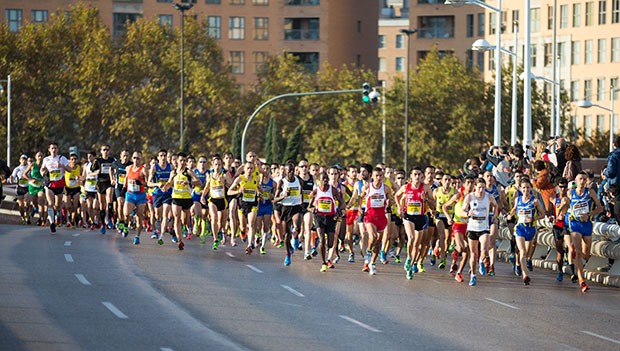
Hydration Tips for Half Marathon
Hydration for longer distances is crucial for your performance but, more importantly, for your overall health. While you should still prepare well for a 5K and 10K, there’s less risk of harm if you just wing it for those shorter distances. In the half marathon, where you could be out on the road for hours, you need to be fully hydrated coming into race day. You'll also need to have a strong hydration and fueling plan for the race itself.
Use your long training runs to work on timing your water and fuel intake to achieve optimal results. It is very individual, but most running coaches suggest you sip water every 15 minutes and begin taking in sports fuel that contains electrolytes around the 30- to 45-minute mark and every 15 to 30 minutes after that. Personally, I find that sipping every 15 minutes is a pretty good guideline. I like to take in fuel at the beginning at the 30-minute mark if I know I am going to be running for 90 minutes or more, but this timing is a personal choice. My recommendation is to try different feeding and drinking intervals to see what works for you and your stomach.
Some runners with time goals skip water stations for fear of wasting precious seconds. Consider carrying a handheld water bottle or wearing a hydration pack. On race morning, drink 16 to 20 ounces of water or a sports drink two to three hours before lining up at the start.
It's important to listen to your body's cues and drink when thirsty, but be cautious of overdrinking. On the flip side, your cues may be compromised due to nerves and excitement about the race, so make sure you’re still sipping even if you don’t feel thirsty.
Hydration Tips for Marathon
It goes without saying that the marathon will test your body. And it’s a distance that’s known to throw off your body’s precious electrolyte balance. To maintain this balance, you’ll need to use your weekly long runs to test what products, methods, and time intervals you will consume on race day. Doing so will help you find the gel, drink, or gummy that helps you maintain your energy levels and not cause GI distress.
You’ll want to be well-hydrated leading up to your long runs and the race. The hydrating timetable is similar to the half marathon: sip water every 15 minutes and begin taking in supplements with calories that contain electrolytes around the 30- to 45-minute mark and every 15 to 30 minutes after that. These are the standard guidelines, but you might find that eating and drinking more while you’re running works best for you.
In the days leading up to the race, focus on maintaining optimal hydration levels by drinking plenty of water and consuming electrolyte-rich foods. I recommend adding a pinch more salt to your food and eating bananas, nuts, yogurts, and high-protein foods. You should be enjoying these things throughout training, too, and there is no need to change the quantity you’re consuming during race week.
On race morning, drink 16 to 24 ounces of water and/or a sports drink two to three hours before you start.
Hydration for Every Distance: My Takeaway
Natalie Rizzo says the most important way to dial in your hydration comes down to three main factors. First, be hydrated going into a run or race.
“If you're already dehydrated going into it, you're setting yourself up for a deficit ahead of time,” she said. “You cannot really make up for that dehydration.”
Next, make sure you are drinking while you run. "I don't know why, but runners are so averse to drinking during exercise or stopping to take a drink during a race,” Rizzo says. “You really do need to drink during running—water, sports drinks, or a combination of the two. It’s going to help you.”
Third, you aren't finished hydrating when your run is over. Continue to replenish your levels, within reason, of course.
FAQs
Should I drink while I’m running?
Yes, you should drink while you’re running. Even during shorter distances, it’s a good idea to take small sips every 15 minutes. Remember that when running for more than 60 minutes, you'll need to drink a sports drink or eat a sports gel with water to ensure proper electrolyte balance.
How much water should I drink for a marathon?
The American College of Sports Medicine offers a guideline that says to drink 5 to 12 ounces of fluids every 15 to 20 minutes during a marathon.(21) If you are doing this with just water, you risk overhydration, so make sure you are taking in electrolytes as you go. More importantly, though, is that this is going to vary from athlete to athlete. To figure out just how much sweat you’re losing and how much you need to drink throughout 26.2 miles, try the "sweat test." To perform the sweat test, weigh yourself before and after your long run.
How do I know if I’m dehydrated?
Symptoms of dehydration include headache, dark yellow urine, low urine output, muscle cramps, high heart rate, high body temperature, and low sweat output.(22) If you’ve been drinking lots of water but feel tired, dizzy, or achy, you might be dealing with an electrolyte imbalance and may consider supplementing your water with a sports drink or gel.(23) If your symptoms worsen or you're at all concerned with your hydration status, consult your primary physician.
How can I replenish my energy while running?
If you’re feeling fatigued while you're running, try sipping a sports drink with electrolytes to boost your energy. Fatigue is one of the telltale signs of electrolyte imbalance.(14)
Why Trust Us?
The health and safety of ACTIVE’s readers is of the utmost importance to us. To ensure your well-being when consuming dietary supplements, the ACTIVE.com editorial team prioritizes products that are independently tested by a third party. We’ve consulted with a team of nutritionists and dieticians to ensure the products we feature are of the highest standard. This helps us create the most accurate, authentic review content for our readers.
These statements have not been evaluated by the Food and Drug Administration. This product is not intended to diagnose, treat, cure, or prevent any disease.
References
- National Research Council (US) Subcommittee on the Tenth Edition of the Recommended Dietary Allowances. Recommended Dietary Allowances: 10th Edition. Washington (DC): National Academies Press (US); 1989. 11, Water and Electrolytes. Available from: https://www.ncbi.nlm.nih.gov/books/NBK234935/
- Institute of Medicine. 2005. Dietary Reference Intakes for Water, Potassium, Sodium, Chloride, and Sulfate. Washington, DC: The National Academies Press. https://doi.org/10.17226/10925.
- Water (n.d) The Nutrition Source. Harvard T.H. Chan School of Public Health. Retrieved June 26, 2023, from https://www.hsph.harvard.edu/nutritionsource/water/
- Judge LW, Bellar DM, Popp JK, Craig BW, Schoeff MA, Hoover DL, Fox B, Kistler BM, Al-Nawaiseh AM. Hydration to Maximize Performance and Recovery: Knowledge, Attitudes, and Behaviors Among Collegiate Track and Field Throwers. J Hum Kinet. 2021 Jul 28;79:111-122. doi: 10.2478/hukin-2021-0065. PMID: 34400991; PMCID: PMC8336541.
- Barley OR, Chapman DW, Abbiss CR. Reviewing the current methods of assessing hydration in athletes. J Int Soc Sports Nutr. 2020 Oct 30;17(1):52. doi: 10.1186/s12970-020-00381-6. PMID: 33126891; PMCID: PMC7602338.
- Riebl SK, Davy BM. The Hydration Equation: Update on Water Balance and Cognitive Performance. ACSMs Health Fit J. 2013 Nov;17(6):21-28. doi: 10.1249/FIT.0b013e3182a9570f. PMID: 25346594; PMCID: PMC4207053.
- National Library of Medicine (2016). Fluid and Electrolyte Balance. NIH. Retrieved June 26, 2023, from https://medlineplus.gov/fluidandelectrolytebalance.html
- Strazzullo P, Leclercq C. Sodium. Adv Nutr. 2014 Mar 1;5(2):188-90. doi: 10.3945/an.113.005215. PMID: 24618759; PMCID: PMC3951800.
- Sica DA, Struthers AD, Cushman WC, Wood M, Banas JS Jr, Epstein M. Importance of potassium in cardiovascular disease. J Clin Hypertens (Greenwich). 2002 May-Jun;4(3):198-206. doi: 10.1111/j.1524-6175.2002.01728.x. PMID: 12045369; PMCID: PMC8101903.
- National Institutes of Health (2022). Potassium - Fact Sheet for Health Professionals. NIH Office of Dietary Supplements. Retrieved June, 2023, from https://ods.od.nih.gov/factsheets/Potassium-HealthProfessional/
- Institute of Medicine (US) Committee to Review Dietary Reference Intakes for Vitamin D and Calcium; Ross AC, Taylor CL, Yaktine AL, et al., editors. Dietary Reference Intakes for Calcium and Vitamin D. Washington (DC): National Academies Press (US); 2011. 2, Overview of Calcium. Available from: https://www.ncbi.nlm.nih.gov/books/NBK56060/
- National Institutes of Health (2022). Magnesium - Fact Sheet for Health Professionals. NIH Office of Dietary Supplements. Retrieved June, 2023, from https://ods.od.nih.gov/factsheets/Magnesium-HealthProfessional/
- Goretti Penido M, Alon US. Phosphate homeostasis and its role in bone health. Pediatr Nephrol. 2012 Nov;27(11):2039-2048. doi: 10.1007/s00467-012-2175-z. Epub 2012 May 3. Erratum in: Pediatr Nephrol. 2017 Jul 6;: PMID: 22552885; PMCID: PMC3461213.
- Electrolyte Imbalance. (August 13, 2022) Cleveland Clinic. Retrieved June 26, 2023, from https://my.clevelandclinic.org/health/symptoms/24019-electrolyte-imbalance
- Yeates KE, Singer M, Morton AR. Salt and water: a simple approach to hyponatremia. CMAJ. 2004 Feb 3;170(3):365-9. Erratum in: CMAJ. 2004 Mar 16;170(6):931. PMID: 14757675; PMCID: PMC331389.
- Bytomski JR. Fueling for Performance. Sports Health. 2018 Jan/Feb;10(1):47-53. doi: 10.1177/1941738117743913. Epub 2017 Nov 27. PMID: 29173121; PMCID: PMC5753973.
- Li X, Wang W, Guo R, Wang A, Wei C. The Effects of Sports Drinks During High-Intensity Exercise on the Carbohydrate Oxidation Rate Among Athletes: A Systematic Review and Meta-Analysis. Front Physiol. 2020 Dec 11;11:574172. doi: 10.3389/fphys.2020.574172. PMID: 33362573; PMCID: PMC7759561.
- Wang Z, Qiu B, Gao J, Del Coso J. Effects of Caffeine Intake on Endurance Running Performance and Time to Exhaustion: A Systematic Review and Meta-Analysis. Nutrients. 2022 Dec 28;15(1):148. doi: 10.3390/nu15010148. PMID: 36615805; PMCID: PMC9824573.
- Malík M, Tlustoš P. Nootropics as Cognitive Enhancers: Types, Dosage and Side Effects of Smart Drugs. Nutrients. 2022 Aug 17;14(16):3367. doi: 10.3390/nu14163367. PMID: 36014874; PMCID: PMC9415189.
- Gibson N, Baker D, Sharples A, Braakhuis A. Improving Mental Performance in an Athletic Population with the Use of Ārepa®, a Blackcurrant Based Nootropic Drink: A Randomized Control Trial. Antioxidants (Basel). 2020 Apr 15;9(4):316. doi: 10.3390/antiox9040316. PMID: 32326538; PMCID: PMC7222175.
- Running a Marathon: Race Day Success. (2022-2023) University of California San Francisco Health. Retrieved June 26, 2023, from https://www.ucsfhealth.org/education/running-a-marathon-race-day-success#
- Taylor K, Jones EB. Adult Dehydration. [Updated 2022 Oct 3]. In: StatPearls [Internet]. Treasure Island (FL): StatPearls Publishing; 2023 Jan-. Available from: https://www.ncbi.nlm.nih.gov/books/NBK555956/
- Schleh MW, Dumke CL. Comparison of Sports Drink Versus Oral Rehydration Solution During Exercise in the Heat. Wilderness Environ Med. 2018 Jun;29(2):185-193. doi: 10.1016/j.wem.2018.01.005. Epub 2018 Mar 14. PMID: 29548770.




